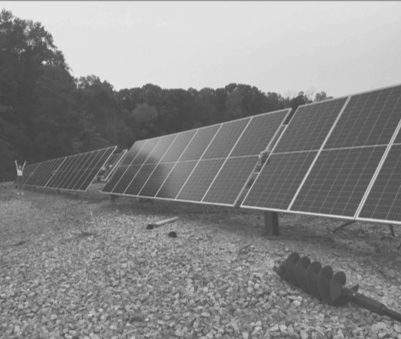Although green and red don’t match on the color wheel, they go together well at Denison. That’s because Denison’s Big Red community is taking steps toward a greener, more sustainable community.
Reaching the goal comes in the form of two new additions to Denison’s campus: electric vehicle, or EV, charging stations and solar panels.
The two EV charging stations, located in the Slayter parking garage, are available for free to charge electric cars. This is a step toward promoting the use of cars that reduce the need for gas.
The stations are free to the public as well, meaning anyone is welcome to charge their car. In addition to these stations, the Granville Inn was chosen by Tesla to be a charging station for electric cars.
The Granville Inn is owned by Denison. These three stations are vital to helping Denison reduce the energy used on campus. Each station costs anywhere between $1,500 and $2,000.
“I like to see Denison making any progress toward a more sustainable campus. Just having it as an option gives opportunities to students who live a more environmentally conscious life at home to continue that here. Before the stations, there was no way someone could have an electric car on campus,” said Rachel Weaver ‘20, an environmental studies and studio art double major from Nashville.
The other renewable energy innovation is the solar panels located in the Bioreserve, just minutes from the main campus. Solar panels are a useful way to harness and store energy from the sun.
Partnering with American Electric Power Company (AEP), Denison’s array of panels covers over 10 acres and is surrounded by brush and trees to hide from the view for surrounding neighbors. The array consists of over 6,000 solar panels.
“AEP bore the cost of installation in return for a 25-year guarantee that Denison would purchase all the electricity that the panels produce. Based on our past several years of usage, the panels will provide approximately 15% of our annual consumption and roughly 50% of our peak load on the sunny, summer days when the solar production is at it highest, so we’re very con dent that we will not be paying AEP for electricity that we won’t consume,” said David English, VP of Finance and Management.
Not only will this reduce Denison’s carbon footprint, as the school has published stating, but it will also have no effect on the accompanying environment, underground water ecosystems or learning done by students in the geoscience department.
In fact, students and teachers can pull data from the solar panels for analysis, but not all are excited about the placement.
“I think the Bioreserve should be that, a biology reservation. These panels mess with the whole atmosphere there and I think it was a bad place to put it,” said Charlie Bassett ‘20, an environmental studies major from Edina, Minnesota. Unfortunately, moving toward a more sustainable community can be expensive. Lucky for Denison, the bill isn’t exactly theirs to pay.
“The primary reasons we entered into the agreement with AEP are to replace fossil-fuel generated electricity with sustainably-produced electricity and that the contract with AEP has a very small inflation factor incorporated in it. Our price next year will be roughly the market price for electricity, but over the next 20 years we predict that the solar panels will end up as a lower-cost source of electricity,” said English.
Denison’s new additions are a good sign for the school’s community. This shows the school will continue to grow a sustainable environment.

